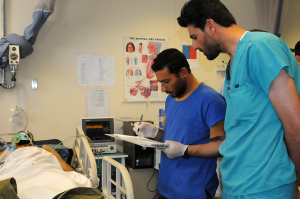By: Murray McLoud
Background on Measles and the MMR Vaccine
Measles is an extremely contagious virus that spreads via air droplets after an infected individual breathes, sneezes, or coughs.[1] Contracting measles does not require close contact with an infected individual—instead, it can occur by breathing in contaminated air droplets or touching an infected surface.[2] To make matters worse, the virus “remains active and contagious in the air for up to two hours.”[3] As a result, a measles patient can quickly infect anywhere from twelve to eighteen individuals they come into contact with.[4] Once someone contracts the measles virus, they do not merely experience a simple rash or fever. Instead, a measles diagnosis can result in severe health consequences including pneumonia, encephalitis,[5] or even death.[6]
Before the development of a vaccine, nearly all children contracted measles before reaching their sixteenth birthday.[7] The United States Centers for Disease Control and Prevention (CDC) even estimates that during the 20thcentury, there were three to four million cases of measles infections.[8] Due to this extreme number of infections, Dr. John Enders set out to create a vaccine and succeeded in 1963.[9] His measles, mumps, and rubella (MMR) vaccine proved to be highly effective, leading to a declaration that measles was eliminated from the United States in 2000.[10]Currently, the MMR vaccine is 97% effective after two doses and can prevent children from contracting this deadly disease throughout their lifetime.[11] Thus, to protect children from contracting measles, parents should ensure their child receives the MMR vaccine.
North Carolina’s Stance on Vaccinations
Under North Carolina (NC) law, every child in the state must be immunized against measles.[12] Further, children are not allowed to attend school if their parents do not present the school with a certificate of immunization showing the child received the measles vaccine.[13] There are two exemptions to this general rule: for medical[14] or religious reasons.[15] The medical exemption is very straightforward because it can only be granted after a licensed NC physician submits a certification to the state that the immunization at issue will be detrimental to the child’s health.[16] On the other hand, the religious exemption is less straightforward in its description of the necessary requirements.
First, this exemption does not require a religious leader, notary, or an attorney to submit a certification to the state for approval detailing how the immunization goes against a person’s “bona fide religious beliefs.”[17] Instead, parents are only required to write a statement to the school about their religious objections.[18] Second, helpful judicial applications or interpretations of this exemption are lacking.[19] For example, there are very few, if any, cases that give guidance on what “bona fide religious belief” truly means.[20] Plus, while N.C. Admin. Code 41A.0403 specifies that non-religious exemptions for personal belief or philosophy are not allowed in North Carolina,[21] it does not provide any explanation for what “not founded upon a religious belief” really means.[22] The lack of specificity when it comes to what qualifies as a religious belief provides parents with a potential loophole to NC’s vaccine requirements.[23] Due to the increased use of this “loophole,” in 2015, legislators even tried to pass Senate Bill 346 to remove the religious exemption as a statutorily provided option because too many parents were using this exemption to avoid vaccinating their children.[24]
House Bill 380 and Its Potential Effect on Measles Outbreaks in NC
Ten years after the death of Senate Bill 346, NC legislators have proposed a new bill, House Bill 380. This bill aims to introduce an idea that goes beyond anything the legislators of Bill 346 would have ever considered. House Bill 380 seeks to add “conscientious objections” to the list of allowable vaccine exemptions for the current student vaccine requirements.[25] Conscientious objections are defined as “a personal disapproval of participating in some specific conduct . . . on moral grounds,” which “may or may not be based on religion.”[26] This new exemption seems to contradict NC’s administrative rules and regulations specifying that non-religious personal belief exemptions are not allowed. If this bill passes and parents abuse this exemption, it could result in a resurgence of measles outbreaks in NC.
For instance, although the Secretary of the U.S. Department of Health and Human Services has declared the MMR vaccine as “crucial to avoiding potentially deadly diseases,”[27] many parents still find reasons to refuse to vaccinate their children. Consequently, there have been numerous measles outbreaks in the United States throughout the 2000s.[28] If passed, Bill 380 could potentially increase the number of unvaccinated students in North Carolina because parents would no longer have to rely on the religious “loophole” exemption to avoid vaccinating their children; instead, their objections would only need to be based on “reasons of conscience.”
The ongoing measles outbreak in Texas exemplifies what could occur in North Carolina if House Bill 380 becomes law. So far this year, 378 measles cases have been confirmed, which is nearly 100 more than the total cases reported for 2024.[29] Texas, which permits a conscientious exemption,[30] is responsible for 309 of these cases, including 211 identified in Gaines County.[31] According to the 2023-2024 data, Gaines County has a conscientious exemption rate of nearly 18%, the highest in the state.[32] Consequently, two schools in Gaines County report vaccination rates of 46.15% and 82.65%,[33] both significantly below the 95% needed for herd immunity.[34] These statistics clearly indicate a correlation between the number of exemptions granted and the severity of the outbreak.
In 2021-2022, the vaccination rate for kindergarteners in NC was 96%,[35] which is above the percentage required for herd immunity. However, in 2023-2024, the vaccination rate dropped to 93.5%.[36] During this time, non-medical exemptions rose from 1.9% to 3.1%.[37] If House Bill 380 passes and NC begins to authorize conscientious exemptions for students, the overall exemption rate will increase; this could lead to a continuous decline in the overall vaccination rate, potentially putting North Carolina at risk of a major measles outbreak similar to the one currently affecting Texas. Such an outbreak could result in major health consequences for the general public or even death for unvaccinated individuals.
[1] Measles, World Health Organization [WHO] (Nov. 14, 2024) https://www.who.int/news-room/fact-sheets/detail/measles.
[2] Id.
[3] Id.
[4] Aliza Rosen, Measles Outbreaks in the U.S. Highlight the Importance of Vaccination, Johns Hopkins Bloomberg Sch. of Pub. Health (Feb. 26, 2025), https://publichealth.jhu.edu/2025/what-to-know-about-measles-and-vaccines.
[5] Measles Symptoms and Complications, Ctrs. for Disease Control & Prevention (May 9, 2024), https://www.cdc.gov/measles/signs-symptoms/index.html (Encephalitis is a condition that causes swelling of the brain, which can lead to lifelong intellectual disabilities or hearing loss).
[6] Id.
[7] History of Measles, Ctrs. for Disease Control & Prevention (May 9, 2024), https://www.cdc.gov/measles/about/history.html.
[8] Id.
[9] History of Measles: Outbreaks and Vaccine Timeline, Mayo Clinic, https://www.mayoclinic.org/diseases-conditions/history-disease-outbreaks-vaccine-timeline/measles (last visited Mar. 23, 2025).
[10] Id.
[11] About Measles, Ctrs. for Disease Control & Prevention (May 29, 2024), https://www.cdc.gov/measles/about/index.html.
[12] N.C. Gen. Stat. § 130A-152 (2023).
[13] N.C. Gen. Stat. § 130A-155 (2007); see also 16 Stong’s N.C. Index 4th, Health § 79 (2025).
[14] N.C. Gen. Stat. § 130A-156 (2007).
[15] N.C. Gen. Stat. § 130A-157 (2002).
[16] Immunization Exemptions in NC, N.C. Dep’t. Health & Hum. Servs. (Mar. 12, 2025) https://www.dph.ncdhhs.gov/programs/epidemiology/immunization/schools/exemptions.
[17] N.C. Gen. Stat. § 130A-157 (2007) (“Upon submission of a written statement of the bona fide religious beliefs and opposition to the immunization requirements, the person may attend the college, university, school or facility without presenting a certificate of immunization.”); see also Immunization Exemptions in NC, supra note 16.
[18] Immunization Exemptions in NC, supra note 16.
[19] In re Stratton, 571 S.E.2d 234, 236 (N.C. Ct. App. 2002) (“Since its amendment and enactment in 1967, G.S. § 130A-157 has not been judicially applied or interpreted.”).
[20] Brian Champion, The Religious Exemption Loophole: A Building Public Health Crisis in North Carolina, 98 N.C. L. Rev. Forum 59, 68 (2020).
[21] 10A N.C. Admin. Code 41A.0403 (2020) (“For example, under North Carolina’s vaccine exemption statute, the parent or guardian of the child must not state any sort of personal or philosophical reason for seeking a religious exemption.”).
[22] Champion, supra note 20, at 68.
[23] Id.
[24] Jason DeBruyn, Across NC, More Parents Are Using Religious Exemption to Avoid Vaccinating Children, WUNC Radio (Aug. 15, 2019), https://www.wunc.org/health/2019-08-15/across-nc-more-parents-are-using-religious-exemption-to-avoid-vaccinating-children (“those claiming a religious exemption has been on the rise.”); see also Laura Leslie, NC Vaccine Bill Dead, WRAL News (Apr. 1, 2015), https://www.wral.com/14554219/.
[25] H.R. 380, Gen. Assemb. (N.C. 2025).
[26] Conscientious Objection, Black’s Law Dictionary (12th ed. 2024).
[27] Robert F. Kennedy, Jr., Measles Outbreak is Call to Action for All of Us, U.S. Dep’t. Health & Hum. Servs (Mar. 3, 2025), https://www.hhs.gov/about/news/2025/03/03/measles-outbreak-call-to-action-for-all-of-us.html.
[28] Measles Vaccination: Know the Facts, Infectious Diseases Soc’y of Am. (Nov. 25, 2024), https://www.idsociety.org/public-health/measles/know-the-facts/.
[29] Measles Cases and Outbreaks, Ctrs. for Disease Control & Prevention (Mar. 21, 2025), https://www.cdc.gov/measles/data-research/index.html.
[30] Texas Immunization Exemptions, Tex. Dep’t of State Health Servs., https://www.dshs.texas.gov/immunizations/school/exemptions (Last visited Mar. 23, 2025); see also Champion, supra note 20, at 66 (citing States with Religious and Philosophical Exemptions from School Immunization Requirements, NAT’L CONF. ST. LEGISLATURES (June 14, 2019), http://www.ncsl.org/research/health/school-immunization-exemption-state-laws.aspx [https://perma.cc/8WNB-3AC3]).
[31]Measles Outbreak, Tex. Dep’t of State Health Servs. (Mar. 21, 2025), https://www.dshs.texas.gov/news-alerts/measles-outbreak-2025.
[32] Conscientious Exemptions, Tex. Dep’t of State Health Servs., https://www.dshs.texas.gov/immunizations/data/school/conscientious-exemptions (Last visited Mar. 23, 2025).
[33] School Coverage, Annual Reports of Immunization Status, Tex. Dep’t of State Health Servs., https://www.dshs.texas.gov/immunizations/data/school/coverage (Last visited Mar. 23, 2025).
[34] Mariah Ellis, Local Pediatricians Say North Carolina Is ‘Vulnerable’ to Measles Outbreak, CBS 17 News (Mar. 13, 2025), https://www.cbs17.com/news/north-carolina-news/local-pediatricians-say-north-carolina-is-vulnerable-to-measles-outbreak/.
[35] Vaccination Coverage and Exemptions among Kindergartners, Ctrs. for Disease Control & Prevention (Oct. 2, 2024), https://www.cdc.gov/schoolvaxview/data/index.html.
[36] Id.
[37] Id.












